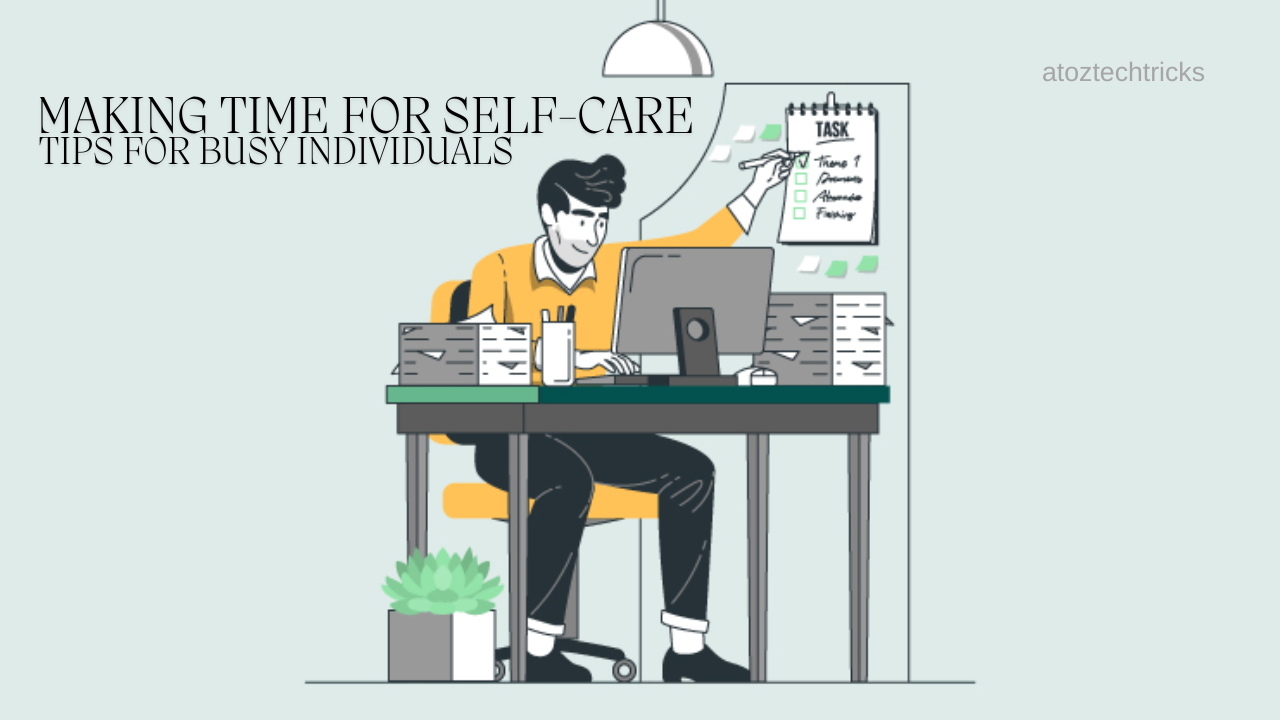Making Time for Self-Care: Tips for Busy Individuals
In today’s fast-paced world, where juggling responsibilities has become the norm, finding time for self-care can seem like an elusive goal. Yet, self-care is not a luxury—it’s a necessity. It’s the foundation for maintaining physical health, mental well-being, and overall life satisfaction. But how can busy individuals carve out time for self-care when it feels like there aren’t enough hours in the day? This article provides practical tips and strategies for making self-care a priority, even amid the hustle and bustle of daily life.
Understanding the Importance of Self-Care
Before diving into tips, it’s essential to understand why self-care is so crucial. Self-care involves activities and practices that help maintain and improve your physical, emotional, and mental health. It’s about taking the time to nourish yourself so you can perform better in your daily tasks and responsibilities.
The Benefits of Self-Care
- Improved Mental Health: Regular self-care practices can reduce stress, anxiety, and depression. By taking time for yourself, you allow your mind to rest and recover, which is vital for maintaining mental clarity and emotional balance.
- Increased Productivity: When you prioritize self-care, you’re better equipped to handle your daily responsibilities. A well-rested, mentally sharp individual is far more productive than someone who is burnt out and exhausted.
- Better Physical Health: Self-care often involves physical activities like exercise, proper nutrition, and sufficient sleep. These practices contribute to better overall health, reducing the risk of chronic illnesses and enhancing your quality of life.
- Enhanced Relationships: When you take care of yourself, you’re in a better position to take care of others. Self-care can lead to more meaningful and positive interactions with loved ones, as you’re less likely to feel irritable or overwhelmed.
- Balanced Life: Incorporating self-care into your routine helps create a more balanced life. It allows you to step back from the demands of your daily schedule and reconnect with your inner self, leading to greater life satisfaction.

Identifying Barriers to Self-Care
One of the biggest challenges in incorporating self-care into a busy schedule is identifying and overcoming the barriers that prevent you from prioritizing yourself. These barriers can be both external and internal.
Common External Barriers
- Work Demands: Long hours, deadlines, and job-related stress can leave little time for self-care. Many people feel that their job must come first, often at the expense of their well-being.
- Family Responsibilities: Caring for children, ageing parents, or other family members can be time-consuming and emotionally draining, making it difficult to focus on your own needs.
- Social Obligations: Constantly saying “yes” to social invitations or volunteering can overextend your time, leaving you with no opportunity to recharge.
- Technology Overload: The constant barrage of emails, messages, and social media notifications can be overwhelming, making it hard to disconnect and find time for self-care.
Common Internal Barriers
- Guilt: Many individuals feel guilty about taking time for themselves, viewing self-care as selfish or indulgent.
- Perfectionism: The need to do everything perfectly can lead to overworking and neglecting self-care.
- Fear of Missing Out (FOMO): The fear that taking a break will cause you to miss out on opportunities or fall behind can prevent you from prioritizing self-care.
- Lack of Awareness: Some people simply don’t realize the importance of self-care or how much it can improve their lives, leading to neglect of their own needs.
Practical Tips for Incorporating Self-Care into a Busy Schedule
Now that we understand the importance of self-care and the barriers that might be holding us back, let’s explore some practical strategies for integrating self-care into a busy lifestyle.
1. Start Small and Be Consistent
One of the most effective ways to begin incorporating self-care into your life is by starting small. You don’t need to overhaul your entire schedule overnight. Instead, identify small, manageable activities that you can easily fit into your day.
- Micro Self-Care Practices: These are brief activities that can be done in five minutes or less. Examples include deep breathing exercises, a quick walk around the block, or a short meditation session. These small actions can have a significant impact on your well-being when done consistently.
- Consistency is Key: Rather than trying to fit in an hour-long workout or a full spa day, focus on doing small self-care activities consistently. Even just five minutes of daily meditation or journaling can lead to long-term benefits.
2. Prioritize Sleep
Sleep is one of the most fundamental aspects of self-care, yet it’s often the first thing to be sacrificed when life gets busy. Poor sleep can lead to a range of health issues, including decreased cognitive function, mood swings, and a weakened immune system.
- Create a Sleep Routine: Establishing a regular sleep routine can help improve the quality of your rest. Try to go to bed and wake up at the same time each day, even on weekends.
- Optimize Your Sleep Environment: Make your bedroom a sanctuary for sleep by minimizing noise, reducing light, and keeping the room at a comfortable temperature. Consider investing in a good-quality mattress and pillows.
- Limit Screen Time Before Bed: The blue light emitted by phones, tablets, and computers can interfere with your sleep. Try to limit screen time to at least an hour before bedtime.
3. Practice Mindfulness
Mindfulness is the practice of being present and fully engaged in the moment. It can be a powerful tool for reducing stress and improving overall well-being.
- Incorporate Mindfulness into Daily Activities: You don’t need to set aside extra time for mindfulness. Instead, practice it during your regular activities, such as eating, walking, or even washing the dishes. Focus on the sensations, smells, and sounds around you.
- Mindful Breathing: Take a few moments throughout the day to focus on your breath. Inhale deeply, hold for a few seconds and exhale slowly. This simple practice can help calm your mind and reduce stress.
- Guided Meditation: If you’re new to mindfulness, consider using guided meditation apps or videos. These resources can help you get started with mindfulness practices that fit your schedule.
4. Set Boundaries
One of the biggest challenges to self-care is overcommitting and not setting boundaries. Learning to say “no” is essential for protecting your time and energy.
- Assess Your Commitments: Take a close look at your schedule and identify any activities or commitments that are not essential. Consider whether they bring you joy or add unnecessary stress to your life.
- Learn to Say No: It’s okay to decline invitations or requests if they don’t align with your priorities or if you’re feeling overwhelmed. Politely saying “no” can free up time for activities that are more important to you.
- Create Work-Life Balance: If work demands are encroaching on your time, it may be necessary to set boundaries with your employer or colleagues. This could involve setting specific work hours or limiting after-hours communication.
5. Delegate and Ask for Help
You don’t have to do everything yourself. Delegating tasks and asking for help can free up time for self-care.
- At Home: Share household responsibilities with family members. If possible, consider hiring help for tasks like cleaning or yard work.
- At Work: If you’re feeling overwhelmed at work, speak with your supervisor about redistributing tasks or getting assistance. Delegating tasks to colleagues or team members can help lighten your load.
- In Your Social Life: If you’re feeling overcommitted with social obligations, consider asking friends or family to help with planning events or gatherings. You can also take turns hosting to reduce the burden on yourself.
Self-Care for Caregivers and Parents: Nurturing Yourself While Caring for Others
6. Incorporate Physical Activity
Exercise is a critical component of self-care, as it promotes physical health, boosts mood, and reduces stress. However, finding time for exercise can be challenging for busy individuals.
- Short Workouts: You don’t need to spend hours at the gym to reap the benefits of exercise. Short, high-intensity workouts, such as a 20-minute HIIT session, can be just as effective as longer routines.
- Active Breaks: Incorporate physical activity into your daily routine by taking short active breaks. For example, take a walk during your lunch break, do a few stretches between meetings, or use a standing desk.
- Make Exercise Fun: Choose activities that you enjoy, whether it’s dancing, hiking, or playing a sport. When exercise is fun, it’s easier to stick with it.
7. Schedule Self-Care Time
Just as you schedule meetings, appointments, and social events, it’s important to schedule time for self-care. Treat it as a non-negotiable appointment with yourself.
- Block Out Time on Your Calendar: Set aside specific times during the week dedicated to self-care activities. Whether it’s an hour of yoga, a relaxing bath, or reading a book, make it a priority.
- Be Realistic: When scheduling self-care time, be realistic about what you can fit into your schedule. It’s better to commit to shorter, more frequent sessions than to overcommit and feel discouraged if you can’t keep up.
- Stick to Your Plan: Once you’ve scheduled self-care time, protect it as you would any other important appointment. Let others know that this time is for you, and avoid scheduling other activities during this period.
8. Practice Self-Compassion
Self-care is not about perfection; it’s about progress. Practising self-compassion involves being kind to yourself, especially when you fall short of your goals.
- Forgive Yourself: If you miss a self-care activity or have an off day, don’t be too hard on yourself. Acknowledge that you’re doing your best and allow yourself to start fresh the next day.
- Celebrate Small Wins: Recognize and celebrate the small steps you take toward self-care. Whether it’s going for a walk, eating a healthy meal, or getting to bed on time, every effort counts.
- Avoid Comparison: Don’t compare your self-care routine to others’. What works for one person may not work for another. Focus on what makes you feel good and brings balance to your life.
9. Utilize Technology for Self-Care
While technology can be a source of stress, it can also be a valuable tool for self-care when used mindfully.
- Self-Care Apps: There are numerous apps available that can help you manage stress, practice mindfulness, and track your self-care activities. Examples include meditation apps, fitness trackers, and sleep monitors.
- Online Communities: Joining online communities or forums focused on self-care can provide support, inspiration, and accountability. These communities can also offer new ideas for incorporating self-care into your routine.
- Virtual Therapy: If finding time for in-person therapy sessions is challenging, consider virtual therapy. Many therapists offer online sessions, making it easier to fit mental health care into a busy schedule.
10. Nourish Your Body
Proper nutrition is a cornerstone of self-care. What you eat can have a significant impact on your energy levels, mood, and overall health.
- Meal Planning: Plan and prepare your meals ahead of time to ensure that you’re eating nutritious, balanced meals. This can save time during the week and help you avoid unhealthy food choices.
- Healthy Snacks: Keep healthy snacks on hand for when you’re on the go. Nuts, fruits, and yoghurt are great options that provide energy and keep you satisfied between meals.
- Stay Hydrated: Drinking enough water throughout the day is essential for maintaining energy levels and supporting overall health. Carry a water bottle with you and make it a habit to sip regularly.
11. Embrace the Power of No
Learning to say “no” is a crucial aspect of self-care, particularly for busy individuals. Overcommitting can lead to burnout, leaving you with little time or energy for yourself.
- Prioritize Your Commitments: Before saying “yes” to new commitments, assess whether they align with your priorities and values. If they don’t, it’s okay to decline.
- Set Clear Boundaries: Communicate your boundaries clearly to others. Let them know that you need time for yourself and that you may not always be available.
- Practice Saying No: Saying “no” can be challenging, especially if you’re used to pleasing others. Practice politely declining requests and offers that don’t serve your well-being.
12. Reflect and Adjust
Self-care is an ongoing process that requires regular reflection and adjustment. What works for you today might not work tomorrow, and that’s okay.
- Regular Check-Ins: Periodically check in with yourself to assess how your self-care routine is working. Are you feeling more balanced and energized? If not, consider what changes might be needed.
- Be Flexible: Life is unpredictable, and there will be times when your self-care routine needs to adapt. Be flexible and willing to adjust your activities and priorities as needed.
- Reevaluate Your Goals: As your life circumstances change, so will your self-care needs. Regularly reevaluate your goals and make sure your self-care routine aligns with your current situation.
Making Self-Care a Priority
Making time for self-care as a busy individual may seem challenging, but it’s entirely possible with planning and a commitment to your well-being. By starting small, setting boundaries, and prioritizing activities that nourish your body and mind, you can create a self-care routine that fits seamlessly into your life. Remember, self-care is not a one-size-fits-all approach; it’s about finding what works best for you and being consistent with it. When you take care of yourself, you’re better equipped to handle the demands of life, leading to greater happiness, health, and fulfilment. So, make self-care a priority, and watch as it transforms your life for the better.
Creating a Personalized Self-Care Routine: Your Ultimate Guide to Wellness




Post Comment